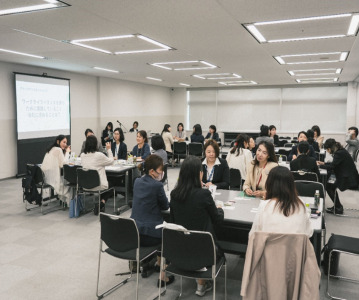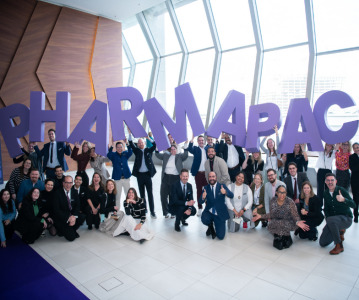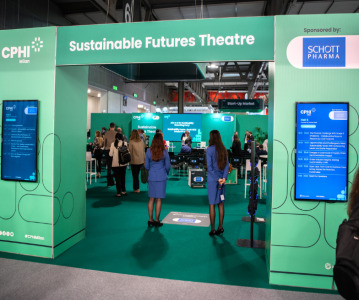CPHI 2015 annual report summary: Part iii

CPHI experts warn USA trade laws are too heavily in favour of big pharma
CPHI Worldwide, (#cphiww) organised by UBM EMEA, announces the findings of its 2015 annual report (part iii, entitled: ‘Push-pull factors on growth’) live from CPHI Worldwide 2015 in Madrid. Four World-renowned experts — Dilip Shah, CEO at Vision Consulting Group; Vivek Sharma CEO -— Pharma Solutions, Piramal Enterprises; Prabir Basu, Consultant; and Alan Sheppard Principal, Global Generics, Thought Leadership at IMS Health — look at the implications of US trade law regulations on generics access, the growth of steriles manufacturing and outsourcing, and the positive impact QbD, ‘technology commons’ and ‘outsourced regulators’ could bring to bear on improving manufacturing standards.
The overall findings reveal that our experts are apprehensive on both the trend towards outsourcing and generics growth. Outsourcing is predicted to grow strongly, particularly in lower cost regions, but without proper oversight, we may be at risk of single negative incident casing a knee-jerk reaction and drug shortages.
For generics, the panel predicts that in the EU, US and the developing world they offer clear benefits to reduce healthcare expenditure. Alan Sheppard strongly argues we need to act now and start reducing any current negative incentives to increased generics adoption, and that we need a sensible pricing solution to increase use of generics rather than policies to lower their cost. In his article, he outlines how generics stimulate innovation in both the generics sector through improved efficiencies, but also, in drug discovery and development, and pharma should be less weary of their global impact.
However, Dilip Shah warns that the reauthorisation of the TPA-2015 will fast track the mega trade agreements that are poised to have the unwanted effect of significantly slowing global access to generics. The clear implication is that these changes are being put in place to benefit big pharma at the expense of patients, generics companies and healthcare bodies. He predicts that as soon as 2017 we will begin seeing a slowdown in the generics market, with the full impact of these ‘mega trade deals’ being felt in 2020. The most notable effect will be a reduction in generic competition, an increased ability for pharma to dictate prices in emerging markets and an easier process of patent extension. Dilip, commented: “If the TPPA is signed in 2015, it would begin from 11 Pacific Rim countries and accelerate with the conclusion of TTIP in 2016. The decline will extend to the US and 28 EU countries, besides members of NAFTA (2) and EFTA (4). The full-blown impact of these mega trade deals will be felt by 2020.”
In his article, Vivek Sharma of Piramal predicts a hugely positive outlook for global steriles sales and anticipates that we will see a significant expansion — 10% per year — in this market over the next 5 years. The drivers for growth in outsourcing are primarily coming from a need for big pharma to de-risk its supply chain, using secondary manufacturing sites. It is also telling that pharma is seeking specialist CDMOs with technological capabilities beyond that of in-house pharma. In the longer term, it is foreseen this will lead to a consolidation amongst increasingly large players offering bespoke biologics and sterile services.
Novel drug delivery systems, and pre-filled synergies are also a key factor in growth, as they overcome potential compliance issues. Interestingly, whilst currently far smaller than the biologics sector, small molecule injectables are predicted to experience the fastest rate of growth. In the near team, drug delivery systems like Liposomes, PEGlyation, Depot Injections are also projected to see a spurt in the growth – especially in therapeutic segments that require efficient targeting of drugs.
Conversely, Prabir Basu sees a mixture of opportunities and threats facing pharma manufacturing. In his view, we need to start evolving our approach to regulation; primarily, we need to start encouraging the sharing of techniques (technology commons) for the good of the industry — rather than keeping the majority of manufacturing process as proprietary. Forebodingly, he also warns that if we don’t think about our approach to quality and outsourcing there is a possibility of another heparin type incident. Such an event, may even result in an overreaction to outsourcing by regulators and ultimately lead to crucial drug shortages as the industry attempts to adapt.
Pharma is presently focused on transferring its manufacturing outsourcing to the lowest cost base, rather than taking an approach of improving costs through process efficiencies, as many other industries have successfully achieved (notably the car industry in Japan). Prabir’s supposition is that these cost reductions may, in part, be lower simply due to a lower regulatory compliance, and FDA is unsuitable to monitor facilities on a global scale with the required regularity. He does however, put forward an innovative solution, whereby the FDA trains a fleet of private certified experts that can inspect all facilities globally at least once per year and the costs should be borne out by the industry (rather than by the US government as is currently the case with the FDA). Then, once these new quality cultures are embedded, QbD will reduce the need to inspect facilities so often, as process controls will be tighter.
Chris Kilbee, Group Director Pharma at CPHI said: “Our goal at CPHI Worldwide is to provide a platform for the industry to share information, debate best practices and support pharma innovation. To help achieve this, in 2015, we expanded our content initiatives to include the CPHI annual report, alongside the pharma insight briefings, the pharma awards, exhibitors’ showcase and the pharma forum. We strongly encourage all our attendees and the wider industry to study the annual report findings closely. For instance, the conclusions that generics, high-potents, steriles and outsourcing are forecast for renewed growth means it is vital that CPHI Worldwide provides a global hub for partnerships to be harnessed through the ingredients zones at CPHI and through our sister brands ISCE, P-MEC and Innopack respectively. Ultimately, it is the dissemination of these trends, potential industry threats and predictions that will sustain further growth over the medium- and long-term. CPHI is the global stage for this debate and our exhibitors and attendees should use these vital insights, alongside our other content initiatives, to ensure they have the best strategic analysis and information to support the most productive business decisions at the show and over the next year”.
The unedited articles will be featured within the CPHI Annual Report (parts i-iv), for more details or to review part iii of the annual report online, please visit: www.cphi.com/europe/networking/cphi-pharma-insights
Related News
-
News Women in Pharma: Career Design for Women
Our monthly Women in Pharma series highlights the influential lives and works of impactful women working across the pharmaceutical industry, and how the industry can work towards making the healthcare industry and workplace more equitable and inclusive... -
News Pfizer may shift production back to US under Trump pharma tariffs
At the 45th TD Cowen annual healthcare conference in Boston, USA, Pfizer CEO Albert Bourla outlined the potential for Pfizer to shift its overseas drug manufacturing back to the US as pharmaceutical industry players weigh their options against Presiden... -
News Women in Pharma: Connecting accessible pharma packaging to patients – a Pharmapack Special
Throughout our Women in Pharma series, we aim to highlight how CPHI events encourage discussions around diversity, equity, and inclusion initiatives in the pharmaceutical industry. -
News CPHI Podcast Series: Packaging expert perspectives at Pharmapack 2025
This month's podcast episode sounds a little different, covering the latest event in Paris – Pharmapack 2025. Digital Editor Lucy Chard speaks to several experts direct from the floor of the show, bringing you right in on the action.&nbs... -
News Closing 2024 with Editors' picks of top articles from the past year
Coming to the end of 2024 and it’s certainly been a busy year, for CPHI and for the rest of the pharmaceutical and healthcare industry. Topics of conversation throughout the last 12 months have been varied, touching on the technical, to the polit... -
News SCHOTT Pharma’s sustainable journey with CPHI
Sustainability is of paramount importance in the pharmaceutical industry. See how a recent partnership between CPHI and SCHOTT Pharma has helped to highlight and accelerate their sustainability journey to reach global goals. -
News CPHI Podcast Series: Investing in a vision for the future of life sciences
In this episode Lucy Chard is joined by Rajiv Khatau to discuss the importance of looking into new therapeutic areas and some of the more niche areas of pharmaceuticals, and investing in the future of the industry. -
News Lessons from CPHI Milan 2024: Sunny Intervals for Pharma Manufacturing?
As the 2024 CPHI conference wrapped up in Milan, we caught up with L.E.K. Consulting – a global strategy consulting firm with deep expertise in pharma manufacturing – to discuss evolving market perspectives and business outlook.
Position your company at the heart of the global Pharma industry with a CPHI Online membership
-
Your products and solutions visible to thousands of visitors within the largest Pharma marketplace
-
Generate high-quality, engaged leads for your business, all year round
-
Promote your business as the industry’s thought-leader by hosting your reports, brochures and videos within your profile
-
Your company’s profile boosted at all participating CPHI events
-
An easy-to-use platform with a detailed dashboard showing your leads and performance







